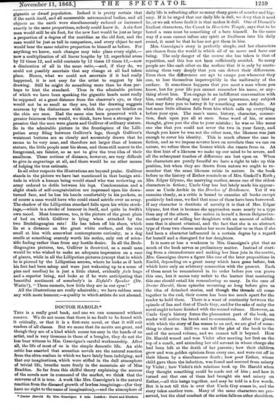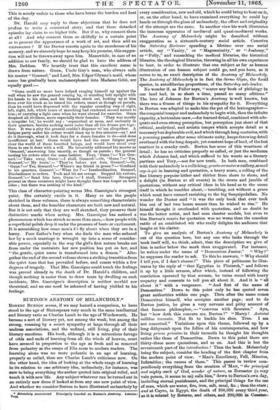DOCTOR HAROLD.* Tars is a really good book, and one
we can commend without reserve. We do not mean that there is no fault to be found with it critically, or that it is a first-rate novel, or that it will suit readers of all classes. But we mean that its merits are great, and though they are of a kind which seems too easy in the hands of an artist, and is very tiresome in those of a bungler, they do not the less bear witness to Mrs. Gascoigne's careful workmanship. After all, the life of most of us is the simple domestic life. An able critic has asserted that sensation novels are the natural reaction from the ultra-realism in which we have lately been indulging, and that our imaginations, which were stifled in the dull atmosphere of trivial life, breathe more freely in the mountain air of Miss Braddon. So far from this skilful theory explaining the success of the novels now in command of the market, we think that the converse of it is true. A work like Mrs. Gascoigne's is the natural reaction from the diseased growth of lawless imaginings—(for they have no right to the name of imagination),—and the atmosphere of
• Doctor Harold By Mn. Gascolgue. 3 vols. London : Hurst and Blacken.
daily life is refreshing after so many sharp gusts of murder and big- amy. If it be urged that our daily life is dull, we deny that it need be, or we ask whose fault it is that makes it dull. One of Disraeli's liveliest characters, the Count in Henrietta Temple, says that to be bored a man must be something of a bore himself. In the same way if a man cannot infuse any spirit or liveliness into his daily round, it must be that he has not got them in him.
Mrs. Gascoigne's story is perfectly simple, and her characters are chosen from the world in which all of us move and have our being. The only danger of the course she has taken is that of repetition, and this has not been sufficiently avoided. So many people are like each other on the surface that it is only by anato- mizing them very deeply that you can detect their differences. Even then the differences are apt to escape you whenever they can, to lose themselves imperceptibly in the uniformity of the surface. It sometimes happens that you meet a man whom you know, but for your life you cannot remember his name, or any- thing about him. You engage in an indifferent conversation with him, carefully eluding any hint of your ignorance, any subject that may force you to betray it by something more definite. At last some little allusion falls from him which calls up everything before your eyes. The man's name, history, character, connec- tion, flash upon you all at once. Some word of his, or some thought, gives you the clue to your mistake ; he was so like some one else that you could not sever the two in your fancy, and though you knew he was not the other man, the likeness was just enough to cover his identity. This is much oftener the case in fiction, and as we impose severer laws on novelists than we can on nature, we refuse them the licence which she exacts from us. At the first hint of a likeness we make up our mind to be severe, and all the subsequent touches of difference are lost upon us. When the characters are purely fanciful we have a right to take up this position, but when they are drawn from nature we ought to re- member that the same likeness exists in nature. In the book before us the history of Esther reminds us of Mrs. Gaskell's Ruth ; Mrs. Edgar Glynne, the marrying mother, seems one of the oldest characters in fiction; Uncle Guy has but lately made his appear- ance as Uncle Archie in the Brookes of Bridlemere. Yet if we examine closely, as a critic is bound to examine all books except positively bad ones, we find that none of these have been borrowed. If any character is destitute of novelty it is that of Mrs. Edgar Glynne, but that is because she approaches more nearly to a type than any of the others. She unites in herself a Seven-Belgravian- mother power of selling her daughters with an amount of selfish- ness that is almost criminal, and the fact that she is an abstract type of these two classes makes her more familiar to us than if she had been a character influenced in a certain degree by a regard for herself and a disregard for her daughters.
It is more or less a weakness in Mrs. Gascoigne's plot that so much of the book serves as preliminary matter. Instead of start- ing from a circumference and making her lines join in the centre, Mrs. Gascoigne draws a figure like one of the later propositions in Euclid, depending on a great many which have gone before, but which have only an arbitrary connection with the present. Enclx of them must be remembered in its order before you can prove this one, but it seems very unfair to the learner that mastering this one should entail his remembering so many. In the case of Doctor Harold, these episodes occurring so long before give us the idea of detached stories, and though the threads all come together in the end, their course has been too much apart for the reader to hold them. There is a want of continuity between the episode of Ina and that of Uncle Guy, and for the sake of unity the novel ought to have finished with the second volume. However, as. Uncle Guy's history forms the pleasantest part of the book, no, reader will notice the break and re-connection. After the gloom with which the storref Ina comes to an end, we are glad of some- thing to cheer us. Still we can tell the plot of the book to the end of the second volume, and we cannot tell it beyond. How Dr. Harold wooed and won Violet after meeting her first on the top of a coach, and attending her old servant in whose charge she had been left at the death of her parents ; how their children, grew and won golden opinions from every one, and were cut off in their bloom by a simultaneous death ; how poor Esther, whose child gave them the infection, was found and rescued from misery by Violet ; how Violet's rich relations took up Dr. Harold when they thought something could be made out of him ; and how it turned out that one of them had brought sin and misery on Esther,—all this hangs together, and may be told in a few words. But it is not till this is over that Uncle Guy comes in, and the story takes another turn. Many of the same characters are pre- served, but the chief conduct of the action falls on other shoulder&
This is surely unfair to those who have borne the burden and heat of the day. Dr. Harold may reply to these objections that he does not profess to write a connected story, and that these detached episodes lay claim to no higher title. But if so, why connect them at all? And why connect them so skilfully to a certain point as to present the appearance of a work of art, and then add an excrescence ? If the Doctor resorts again to the storehouse of his memory, and we sincerely hope he may keep his promise, this sugges- tion will not be thrown away upon him. Meanwhile, in case of an addition to our family, we should be glad to have the address of Mrs. Beddoes. We heartily trust that this excellent nurse is drawn from nature. Gunn, Uncle Guy's man, who always calls his master " Gennerl," and Lard, Mrs. Edgar Glynne's maid, whose name has gradually been metamorphosed into Madame Grisi, are equally good :—
"Gunn could no more have helped ranging himself up against the wall when he saw the general coming by, or standing bolt upright with his hands to his sides, and his thumbs stuck out, looking up at him from over his stock as he issued his orders, smart as though on parade, than he could have dispensed with the regular sounding step of right, left, right, left, which years of marching had rendered second nature to him ; or carrying a light cane when he went abroad for exercise. Gunn despised all civilians, more especially their females. They was mostly a irregular lot,' he would say ; onpunctual at mess, and oncleanly in their quarters, besides making more noise than all the drums put toge- ther. It was a pity the general couldn't dispense wi'em altogether. A fatigue party under his orders would dean up in five rainutes—ay ! and do it thorough, what it took days for a dozen females to do—and done insufficient at last.' Gunn would have had the same fatigue party clear the world of these besotted beings, and would have stood over them to see it done with a will. He invariably addressed his master as Gennerl,' answering him smartly, as though on parade ; the general
issuing his orders after the same fashion. Thus, Gunn Yes Oen- Take away, Gunn.'—I shall, Gennerl.'—Or, Gunn Yes, Gennerl.'—' My boots.'— They're before yer toes, Gennerl.'—Or,
' Gunn Yes, GennerL'—' Where's my friend in green ?'—'0onfinecl to his quarters, Gennerl.'—' What for ?'—' Insubordination, Gennerl. Disobedience to orders. Took and bit me savage. Stopped his rations, Gennerl.'—' Send him here, Gunn.'—' I shall, Gennerl.' Strangers present on these occasions might have thought there was temper on both sides ; but there was nothing of the kind."
This class of character-painting seems Mrs. Gascoigne's strongest point. She certainly excels in it. Many as are the people sketched in these volumes, there is always something characteristic about them, and the humbler characters are both new and natural. But it is not only that they are well sketched, they preserve their distinctive marks when acting. Mrs. Gascoigne has noticed a phenomenon which has struck us more than once,—how people with a superficial polish drop it under the pressure of haste or excitement. It is astonishing how some men's h's fly about when they are in a harry. Poor Esther's fury when she finds the man who seduced her by a mock marriage is wrought up into a scene of consider- able power, especially in the way the girl's first nature breaks out from under the restraints her new position has put on her, and " the gentle, quiet nurse is transformed into a demon." Alto- gether the end of the second volume shows a striking transition from the quiet tone that has prevailed before, and comes within a few degrees of tragedy. That Mrs. Gascoigne could touch the feelings was proved already in the death of Dr. Harold's children, and though nothing is easier than to draw tears by dwelling on such incidents, Mrs. Gascoigne's description is neither morbid nor theatrical, and no one need be ashamed of having yielded to his feelings.































 Previous page
Previous page